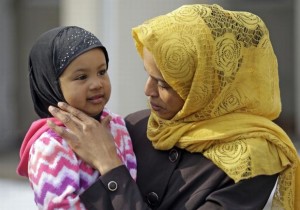
Somali refugee Nimo Hashi holds her daughter Taslim at their home Tuesday, Jan. 31, 2017, in Salt Lake City. Hashi bought a new kitchen table and couches for her Salt Lake City apartment in joyful anticipation of reuniting Friday with her husband for the first time in nearly three years. But he won’t be arriving as planned to see her and the 2-year-old daughter he’s never met. He is among hundreds of people stuck in limbo after President Donald Trump’s executive order temporarily banned refugees and nearly all travelers from seven Muslim-majority countries, including Somalia. (Photo by RICK BOWMER/AP)
SALT LAKE CITY — Refugee resettlement organizations are bracing for significant funding cuts and possible layoffs over the coming months during President Donald Trump’s temporary refugee ban.
The agencies receive a certain amount of federal dollars per refugee they help resettle, which means they would lose a key source of funding unless the Trump administration provides funds in the interim during the 120-day temporary halt to refugees entering the US.
Catholic Charities USA says the executive order will cost the organization millions of dollars and put at risk about 700 jobs out of the 54,000 jobs at its agencies around the country, according to spokeswoman Patricia Cole.
The group launched an $8 million fundraising campaign this week to help replace the funding it expects to lose during the four-month moratorium.
Catholic Charities agencies resettled roughly 23,000 of the nearly 85,000 refugees that entered the US last year, Cole said. Most of them were women and children.
It is one of nine agencies that handle refugee resettlement. Another agency, International Rescue Committee is asking its donors to help raise $5 million to ensure its 29 offices around the country can continue to support refugees already here.
Making matters worse for agencies is that President Barack Obama’s administration told resettlement organizations to staff up in anticipation of an increase in refugees this year, said Mark Hetfield, president of HIAS, formerly the Hebrew Immigrant Aid Society.
The organization resettled nearly 4,200 refugees last year and was expecting nearly 4,800 this year, he said. Hetfield said agencies receive a set amount of $2,075 per refugee for initial reception and placement. The amounts organizations get after depends on many different factors.
“We’re not going to be able to keep staff on over several months if the funding disappears,” Hetfield said. “If they really are serious about this continuing, they’ll have to provide some kind of infrastructure support so our staff can survive the pause.”
Catholic Charities of Southeast Michigan, which includes Detroit and suburbs, said it laid off four people in January from the refugee program, leaving a staff of 10. The agency said those jobs would be at risk if there’s an “extended interruption” in the flow of refugees.
One World Relief agency outside Chicago estimates it will lose about $500,000 in funding due to the executive order, equivalent to about 20 percent of its funding, shows an email sent to supporters. The organization is asking for help to raise $250,000 to keep core services going.
At the offices of Catholic Community Services in Salt Lake City, pictures of the 70 employees in the refugee resettlement program are pinned on a tac board. Many of them are refugees who used their own experience and specialized training from the agency to become valuable staffers, said Aden Batar, director of immigration and refugee resettlement.
Batar, a refugee himself who worked his way up into his current role since joining the agency two decades ago, worries about how these employees will support their families if he has to lay off some or cut back hours. Most of the program’s funding comes from the federal government, he said.
After the Sept. 11, 2001 terrorist attacks, the government provided interim funding during a pause on the refugee program, Batar said. But he sees no indication that will happen this time. That’s why his organization is asking community partners to donate.
“We can rely on our community more than the federal government,” Batar said. –Brady McCombs